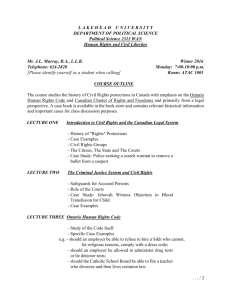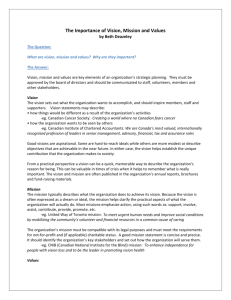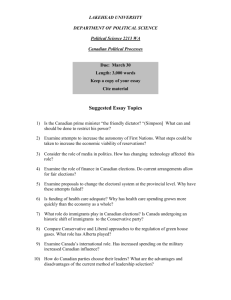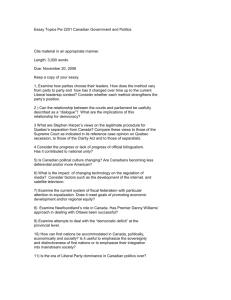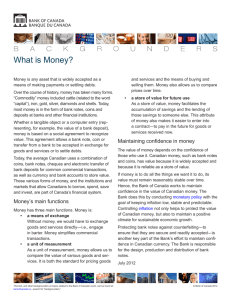An Introduction to Canada's Government and Legal System
advertisement
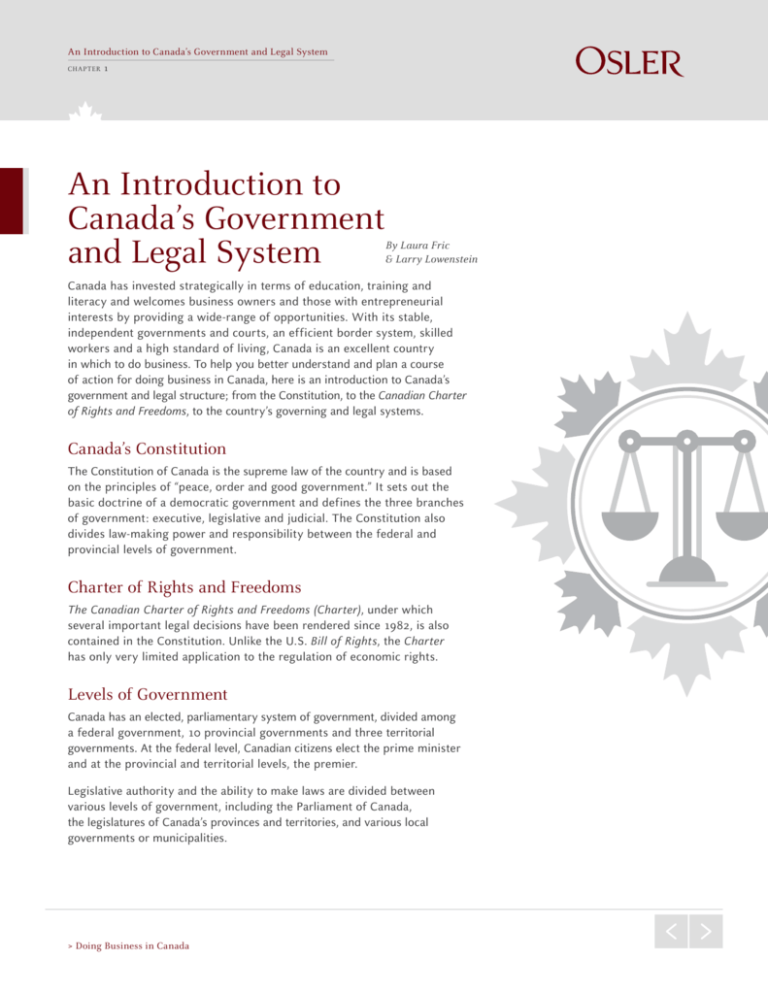
An Introduction to Canada’s Government and Legal System chapter 1 An Introduction to Canada’s Government and Legal System By Laura Fric & Larry Lowenstein Canada has invested strategically in terms of education, training and literacy and welcomes business owners and those with entrepreneurial interests by providing a wide-range of opportunities. With its stable, independent governments and courts, an efficient border system, skilled workers and a high standard of living, Canada is an excellent country in which to do business. To help you better understand and plan a course of action for doing business in Canada, here is an introduction to Canada’s government and legal structure; from the Constitution, to the Canadian Charter of Rights and Freedoms, to the country’s governing and legal systems. 1. Canada’s Constitution The Constitution of Canada is the supreme law of the country and is based on the principles of “peace, order and good government.” It sets out the basic doctrine of a democratic government and defines the three branches of government: executive, legislative and judicial. The Constitution also divides law-making power and responsibility between the federal and provincial levels of government. Charter of Rights and Freedoms The Canadian Charter of Rights and Freedoms (Charter), under which several important legal decisions have been rendered since 1982, is also contained in the Constitution. Unlike the U.S. Bill of Rights, the Charter has only very limited application to the regulation of economic rights. Levels of Government Canada has an elected, parliamentary system of government, divided among a federal government, 10 provincial governments and three territorial governments. At the federal level, Canadian citizens elect the prime minister and at the provincial and territorial levels, the premier. Legislative authority and the ability to make laws are divided between various levels of government, including the Parliament of Canada, the legislatures of Canada’s provinces and territories, and various local governments or municipalities. > Doing Business in Canada 5. An Introduction to Canada’s Government and Legal System chapter 1 When establishing or acquiring a business in Canada, business owners and investors must be aware of the federal laws as well as those of provinces or territories where the business will be conducted. The federal government is responsible for areas such as foreign affairs and international trade, defence, the monetary system, criminal law, patents, bankruptcy/insolvency and certain “national” sectors, such as financial services and telecommunications. The provinces are responsible for education, health care, municipal affairs and national resources along with other specified areas. In addition, unique arrangements have been developed for Aboriginal peoples in various regions of the country. For example, Aboriginal groups may have a range of rights and powers over certain lands under the Indian Act and pursuant to historic and treaty rights. (For more information, see Chapter 17, Aboriginal Law in Canada.) Laws can also vary by province, such as Bill 101 (or the Charter of the French Language as it’s also known), in Québec, the only province in Canada where French is the sole official language. Two Systems of Laws While Canada is quite similar to many western democracies, it is also unique with the existence of two systems of law. The criminal law system governs the whole country and the civil law system governs most jurisdictions in Canada, both are based on the English precedent-based system of common law. The civil law system, in the province of Québec only, is based on the French Code Napoléon. Foreign companies and investors interested in doing business in Canada nationally should ensure that their Canadian legal advisors are well versed in both systems. Canadian Courts Historically, Canada tended to attach more importance to British then to American precedent but in recent years; American case law has become increasingly influential with Canadian courts and legislators, particularly with respect to commercial matters. Business owners are most likely to meet in courts regarding commercial matters. Canada’s judiciary is completely independent from other branches of government and all government action is subject to judicial scrutiny. Canadian judges are fair and well-respected. > Doing Business in Canada An Introduction to Canada’s Government and Legal System chapter 1 Should a company find themselves facing legal action, they will deal with court proceedings in the federal courts or in the superior courts of the provinces (which are also presided over by federally appointed judges). Canada generally has a “loser pays” civil litigation system, meaning that the losing side of any court battle can usually expect to pay some portion of the successful party’s legal costs. Canadian courts will generally recognize court orders made by foreign jurisdictions, where certain criteria are met e.g., the judgment was obtained pursuant to a fair and unbiased process. In addition to pursuing legal action in the courts, business owners should be aware that commercial disputes may result in class actions proceedings or in mediation and arbitration. Canadian Class Actions Canada’s approach to class actions is relatively welcoming. The number of class proceedings being brought in Canada has grown substantially in the last 15 years, with the plaintiff’s bar becoming larger and more experienced. It is now not uncommon to have similar actions commenced in many provinces at the same time and in a coordinated way. It is also common for Canadian proceedings to be brought that mirror proceedings brought in other countries – for example securities and consumer class actions. Arbitrations and Mediations It is increasingly common for companies to litigate matters in private, confidential arbitrations. Canada has been host to many complex international arbitrations, and Canadian courts will generally recognize arbitration decisions. Canada also hosts a number of mediations, with many sophisticated former judges and senior business people and lawyers available to mediate complex commercial disputes and litigious matters. Canadian courts will generally recognize and enforce arbitration decisions made in other jurisdictions. Regulatory Environment Each of the 10 provinces and three territories in Canada has enacted laws that govern securities transactions, and each has established a securities commission or similar securities regulatory authority. Unlike the United States, Canadadoes not have a single federal securities regulator. The provincial securities legislation and regulations are augmented by rules and policies enacted by the respective securities authorities and although the securities regulatory authorities attempt to harmonize their rules nationally (through the Canadian Securities > Doing Business in Canada The number of class proceedings being brought in Canada has grown substantially in the last 15 years, with the plaintiff’s bar becoming larger and more experienced. An Introduction to Canada’s Government and Legal System chapter 1 Administrators, an umbrella organization compromising representatives of each securities regulatory authority in Canada), some have been harmonized, others have not. Canadian securities laws must be considered before any acquisition of disposition of outstanding shares of a company in Canada. (For more information, see Chapter 19, Regulatory Environment and Risk Management.) This guide is simply a supplementary road map as you prepare for your business needs and gather information. As you navigate your way through the following chapters, our hope is that you will find the information in the following chapters helpful to better prepare you going forward. – Osler’s Litigation Group provides strategic litigation services and advice on class actions to many leading domestic and international enterprises. Laura Fric and Larry Lowenstein are partners in our group. Laura Fric lfric@osler.com 416.862.5899 > Doing Business in Canada Larry Lowenstein llowenstein@osler.com 416.862.6454

